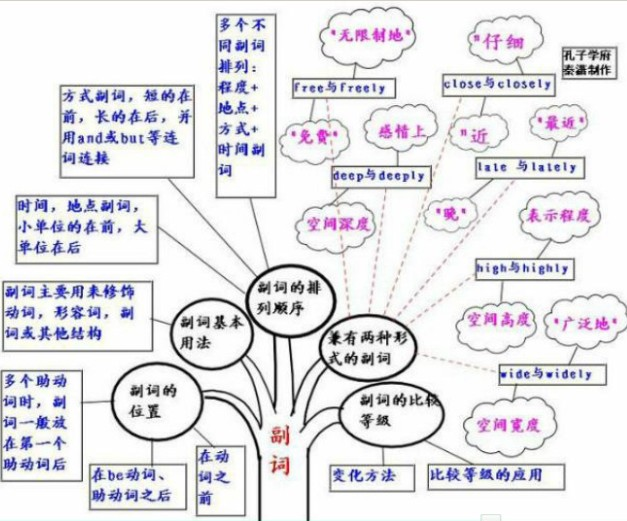本试题 “She is always________to help others at school and every other student wants to play with her________.[ ]A. willing; willingB. ready; willingC. will...” 主要考查您对副词
现在进行时
等考点的理解。关于这些考点您可以点击下面的选项卡查看详细档案。
- 副词
- 现在进行时
副词的概念:
副词是指在句子中表示行为或状态特征的词,用来修饰动词、形容词、其他副词、介词短语、非谓语动词乃至整个句子,表示时间、地点、程度、方式等概念。
副词的位置:
1)在动词之前。
2)在be动词、助动词之后。
3)多个助动词时,副词一般放在第一个助动词后。
注意:
a. 大多数方式副词位于句尾,但宾语过长,副词可以提前,以使句子平衡。
如:We could see very clearly a strange light ahead of us.
b. 方式副词well,badly糟、坏,hard等只放在句尾。
如:He speaks English well.
副词的排列顺序:
1)时间,地点副词,小单位的在前,大单位在后。
2)方式副词,短的在前,长的在后,并用and或but等连词连接。
如:Please write slowly and carefully.
3)多个不同副词排列:程度+地点+方式+时间副词。
注意:副词very可以修饰形容词,但不能修饰动词。
改错:(错)I very like English.
(对)I like English very much.
注意:副词enough要放在形容词的后面,形容词enough放在名词前后都可。
如:I don't know him well enough.
There is enough food for everyone to eat.
There is food enough for everyone to eat.
兼有两种形式的副词:
1)close与closely:
close意思是“近”;closely意思是“仔细地”。
如: He is sitting close to me.
Watch him closely.
2)late与lately:
late意思是"晚";lately意思是“最近” 。
如:You have come too late.
What have you been doing lately?
3)deep与deeply:
deep意思是“深”,表示空间深度;deeply时常表示感情上的深度,“深深地” 。
如:He pushed the stick deep into the mud.
Even father was deeply moved by the film.
4)high与highly:
high表示空间高度;highly表示程度,相当于much。
如:The plane was flying high.
I think highly of your opinion.
5)wide与widely:
wide表示空间宽度;widely意思是“广泛地”,“在许多地方”。
如:He opened the door wide.
English is widely used in the world.
6)free与freely:
free的意思是“免费”;freely的意思是“无限制地”。
如:You can eat free in my restaurant whenever you like.
You may speak freely, say what you like.
副词知识体系:

现在进行时的概念:
现在进行时表示现在或当前一段时间正在进行的动作。可以表示有计划的未来,也就是用现在进行时表示将来。现在进行时的构成是:主语+be+v.ing〔现在分词〕形式:
例如:He is writing on the desk.
现在进行时的基本用法:
表示现在(指说话人说话时)正在发生的事情。
例如:We are waiting for you. 我们正在等你。
b. 习惯进行:表示长期的或重复性的动作,说话时动作未必正在进行。
例如:Mr.Green is writing another novel. 他在写另一部小说。(说话时并未在写,只处于写作的状态。)
c. 表示渐变,这样的动词有:get, grow, become, turn, run, go, begin等。
例如:The leaves are turning red. 叶子在变红。
It's getting warmer and warmer. 天越来越热了。
d. 与always, constantly, forever等词连用,表示反复发生的动作或持续存在的状态,往往带有说话人的主观色彩。
例如:You are always changing your mind. 你老是改变主意。
现在进行时用法点拨:
1、一般现在时代替现在进行时:
在Here comes…/There goes…等句型里,用一般现在时代替现在进行时。
例如:There goes the bell.铃响了。
2、现在进行时代替将来时:
1)表示即将发生的或预定中计划好的活动。
例如:Are you staying with us this weekend? 和我们一起度周末好吗?
We are leaving soon. 我们马上就走。
2)渐变动词,如get, run, grow, become, begin以及瞬间动词die等。
例如:He is dying. 他要死了。
与“She is always________to help others at school and every o...”考查相似的试题有:
- It was ____ that he had to ask for help.[ ]A. so big workB. so big a workC. such a big workD. such a big job
- On snowy days, you have to drive very_________to avoid traffic accidents.A.cautiouslyB.neatlyC.smoothlyD.Properly
- I thought she was African, but ______ she’s Spanish.A.besidesB.actuallyC.on the other handD.at all
- She is always________to help others at school and every other student wants to play with her________.[ ]A. willing; w...
- It is one thing to enjoy listening to good music, but it is ________ another to play it well yourself.[ ]A. quiteB. v...
- We have to work hard, ______ we’ll lose the chance.A. thereforeB. otherwiseC. besidesD. however
- The rain was heavy and _________ the land was flooded.A.consequentlyB.environmentallyC.previouslyD.severely
- Professor Smith, along with his assistants, ______ on the project day and night to meet the deadline.[ ]A. workB. wor...
- E-mail as well as telephones, _____ an important part in daily communication.[ ]A. is playingB. have playedC. are pla...
- Hurry up! The train _____. You know it _____ at 8:30 a.m.[ ]A. leaves; leavesB. is leaving; leavesC. leaves; is leavi...